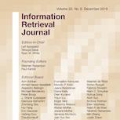Software Engineering activities are information intensive. Research proposes Information Retrieval (IR) techniques to support engineers in their daily tasks, such as establishing and maintaining traceability links, fault identification, and software maintenance. We describe an engineering task, test case selection, and illustrate our problem analysis and solution discovery process. The objective of the study is to gain an understanding of to what extent IR techniques (one potential solution) can be applied to test case selection and provide decision support in a large-scale, industrial setting. We analyze, in the context of the studied company, how test case selection is performed and design a series of experiments evaluating the performance of different IR techniques. Each experiment provides lessons learned from implementation, execution, and results, feeding to its successor. The three experiments led to the following observations: 1) there is a lack of research on scalable parameter optimization of IR techniques for software engineering problems; 2) scaling IR techniques to industry data is challenging, in particular for latent semantic analysis; 3) the IR context poses constraints on the empirical evaluation of IR techniques, requiring more research on developing valid statistical approaches. We believe that our experiences in conducting a series of IR experiments with industry grade data are valuable for peer researchers so that they can avoid the pitfalls that we have encountered. Furthermore, we identified challenges that need to be addressed in order to bridge the gap between laboratory IR experiments and real applications of IR in the industry.
翻译:暂无翻译



